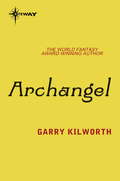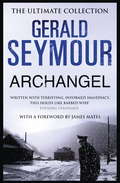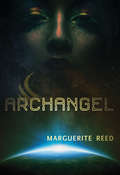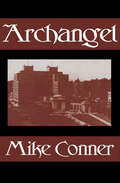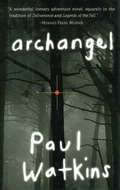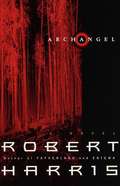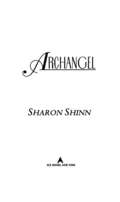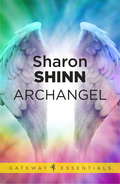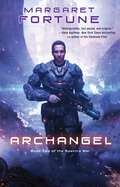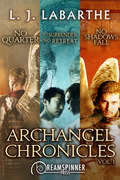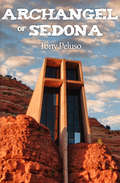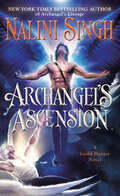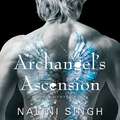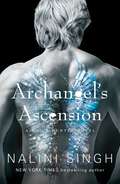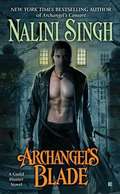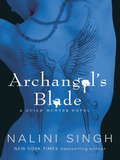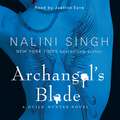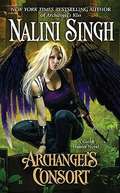- Table View
- List View
Archangel
by Garry KilworthIn 1997 an angel fell to Earth. Dave Peters, and his sidekick in the San Francisco police squad, Danny, were right there at the time. Caught up in a supernatural war between good and evil, they had eventually tracked down the rogue entity and brought an end to its reign of deadly fire. But now the stakes had risen. It's 2002, and there's a demon abroad in London, a soul so corrupt and foul that Satan himself has recruited him from the legions of the dead. Only one entity in Heaven can counter his power - an Archangel, an angel of the highest rank.
Archangel
by Gerald SeymourWhen British Intelligence asks Michael Holly, a mechanical engineer, to run an errand for them in the Soviet Union, the consequences of capture are never mentioned. But what seems a simple handover carries unimaginable risks, and now Holly is facing fifteen years imprisoned in a gulag in the midst of the frozen tundra. Along with his fellow inmates, Holly has to find the strength to fight the camp's brutal regime in any way he can. But Camp 3 is the place where hopes and dreams are brought to die. Against the might of the Soviet state, is Michael Holly strong enough to sustain his will to survive?
Archangel
by Gerald SeymourFrom the author of Harry's Game - A Sunday Times '100 best crime novels and thrillers since 1945' pickWhen British Intelligence asks Michael Holly, a mechanical engineer, to run an errand for them in the Soviet Union, the consequences of capture are never mentioned. But what seems a simple handover carries unimaginable risks, and now Holly is facing fifteen years imprisoned in a gulag in the midst of the frozen tundra. Along with his fellow inmates, Holly has to find the strength to fight the camp's brutal regime in any way he can. But Camp 3 is the place where hopes and dreams are brought to die. Against the might of the Soviet state, is Michael Holly strong enough to sustain his will to survive?
Archangel
by Marguerite ReedThe Earth is dying, and our hopes are pinned on Ubastis, an untamed paradise at the edge of colonized space. But such an influx of people threatens the planet's unstudied ecosystem -- a tenuous research colony must complete its analysis, lest humanity abandon one planet only to die on another. The Ubasti colonists barely get by on their own. To acquire the tools they need, they are relegated to selling whatever they can to outside investors. For xenobiologist Vashti Loren, this means bringing Offworlders on safari to hunt the specimens she and her fellow biologists so desperately need to study. Haunted by the violent death of her husband, the heroic and celebrated Lasse Undset, Vashti must balance the needs of Ubastis against the swelling crush of settlers. Vashti struggles in her role as one of the few colonists licensed to carry deadly weapons, just as she struggles with her history of using them. And when she discovers a genetically engineered soldier smuggled onto the surface, Vashti must face the nightmare of her husband's murder all over again. Standing at the threshold of humanity's greatest hope, she alone understands the darkness of guarding paradise.
Archangel
by Mike ConnerFrom the book jacket: Archangel is set in an alternate universe Minneapolis, in the late 1920s, after a decade of devastating plague. Hun, a blood disease that appeared during World War I, ended the war and is killing more people every year. Like other great cities, Minneapolis is a shadow of its former self, isolated by the breakdown of civilization. Whites are dying while blacks are immune and trying to forge a new social compact in a radically changed society. And a mysterious woman calling herself "the Archangel" broadcasts the music of the jazz age-and the real, uncensored news-from a pirate radio station. Danny Constantine, a young newspaperman, discovers a weird series of murders that look like the work of a vampire. But in a world of bad news, even his own paper doesn't care to print his discovery. Danny has been alone in the world since his wife died of Hun, and his investigation becomes his personal crusade, involving him with an embittered black police officer, a doctor seeking a cure for the disease, and the social forces contending for power in the crumbling city- and finally, with the Archangel. Michael Conner has been building a reputation as one of the most talented younger writers in science fiction. His recent story, "Guide Dog," won the 1993 Nebula Award. Now Conner has written Archangel, his most powerful and intriguing work yet.
Archangel
by Mike ConnerNebula-award winning author Mike Conner presents a novel about a world that all of us can recognize, a world of what might have been. In Minneapolis in the 1930&’s, the deadly plague that ended the First World War is decimating the population. The only people who seem to be immune to its effects are black people. What does this mean for the future of the city—and of the nation? Young newsman Danny Constantine finds that not everyone is dying from the plague. He has discovered a series of bizarre deaths—murders that look like the work of a vampire. In these times of bad news, his own paper refuses to print the story and Danny must search for the truth on his own, except for a mysterious woman known only as archangel, who always seems to appear when needed most.
Archangel
by Paul WatkinsLumber baron Noah Mackenzie has a bitter history with the Algonquin forest, and now he's trying to clear-cut the part he considers his own. In the remote Maine town of Abenaki Juntion, only Madeleine Cody stands up to Mackenzie. <P><P>Using her small newspaper, The Forest Sentinel, she has long tried to peacefully stop the excessive logging. But when radical Adam Gabriel arrives at Abenaki Junction, he proposes a new and dangerous form of protest. Gabriel pushes both Madeleine and Mackenzie to defend what they love - no matter the cost.
Archangel
by Robert HarrisOne night, Kelso is visited in his hotel room by an old NKVD officer, a former bodyguard of the secret police chief Lavrenty Beria. The old man claims to have been at Stalin's dacha on the night Stalin had his fatal stroke, and to have helped Beria steal the dictator's private papers, among them a notebook. Kelso decides to use his last morning in Moscow to check out the old man's story. But what starts as an idle inquiry in the Lenin Library soon turns into a murderous chase across nighttime Moscow and up to northern Russia--to the vast forests near the White Sea port of Archangel, where the final secret of Josef Stalin has been hidden for almost half a century.
Archangel
by Sharon ShinnMore information to be announced soon on this forthcoming title from Penguin USA.
Archangel
by Sharon ShinnFrom national bestselling author Sharon Shinn comes a stunningly beautiful novel of a distant future—where the fate of the world rests on the voice of an angel...Through science, faith, and force of will, the Harmonics carved out for themselves a society that they conceived as perfect. Diverse peoples held together by respect for each other. Angels to guard the mortals and mystics to guard the forbidden knowldge. Jehovah to watch over them all...Generations later, the armed starship Jehovah still looms over the planet of Samaria, programmed to unleash its arsenal if peace is not sustained. But with the coming of an age of corruption, Samaria's only hope lies in the crowning of a new Archangel. The oracles have chosen Gabriel for this honor, and further decreed that he must first wed a mortal woman named Rachel.It is his destiny and hers. And Gabriel is certain that she will greet the news of her betrothal with enthusiasm, and a devotion to duty equal to his own.Rachel, however, has other ideas...Winner of the William Crawford Award for Achievement in FantasyNominated for the John W. Campbell Award for Best New Writer From the Paperback edition.
Archangel
by Sharon ShinnAnd so it came to pass...Through science, faith and force of will, the Harmonics carved out for themselves a society they perceived as perfect. Diverse peoples held together by respect for each other and the prospect of swift punishment if their laws were disobeyed. Fertile land that embraced a variety of climates and seasons. Angels to guard the mortals and mystics to guard the forbidden knowledge. Jehovah to watch over them all...Generations later, the armed space cruiser Jehovah still looms over the planet Samaria, programmed to unleash its arsenal if peace is not sustained. Bu tan age of corruption has come to the land, threatening that peace and placing the Samarians in grave danger. Their only hope lies in the crowning of a new Archangel. The oracles have chosen for this honour the angel named Gabriel and further decreed that he must first wed a mortal woman named Rachel.It is his destiny and hers. And Gabriel is certain that she will greet the news of her betrothal with enthusiasm and a devotion to duty equal to his own.Rachel, however, has other ideas...
Archangel (Samaria #1)
by Sharon ShinnAnd so it came to pass... <P> Through science, faith and force of will, the Harmonics carved out for themselves a society that they conceived of as perfect. Diverse peoples held together by respect for each other and the prospect of swift punishment if they disobeyed their laws. Fertile land that embraced a variety of climates and seasons. Angels to guard the mortals and mystics to guard the forbidden knowledge. Jehovah to watch over them all... But an age of corruption has come to the land, threatening their peace and placing the Samarians in grave danger. Their only hope lies in the crowning of a new Archangel. The oracles have chosen for this honor the angel named Gabriel, and further decreed that he must first wed a mortal woman named Rachel. <P> It is his destiny and hers. And Gabriel is certain that she will greet the news of her betrothal with enthusiasm, and a devotion to duty equal to his own. <P> Rachel, however, has other ideas...<P>
Archangel (Spectre War #2)
by Margaret FortuneArchangel is the second installment of the explosive, pulse-pounding Spectre War science fiction series.An enemy you can’t kill. A soldier who can’t fight. An interstellar war that can’t be won . . . until now. As a soldier of the Celestial Expanse, Guardian First Class Michael Sorenson knows better than anyone that when the Spectres invade, there are only two options. Run or die. However, his defensive war takes on a whole new spin when he’s recruited into Division 7, a Research & Development facility with the ultimate mission: to create a large-scale weapon that can kill Spectres en masse. Here Michael joins a team of military elite who have the daring—and dangerous—task of taking new weapons prototypes out into the field for testing on enemy troops. Yet the closer they come to developing a working WMD, the more it becomes clear: There’s a saboteur in R&D. With all signs pointing to a massive Spectre attack brewing on the horizon, the creation of a new weapons system yields an opportunity to end the threat once and for all. As the days count down toward its launch, Michael must hunt down the saboteur . . . before the saboteur hunts down him.
Archangel Alchemy Healing: The Celestial Science in the Vibration of the Universe
by Alexandra Wenman• Details the practice of Archangel Alchemy, an angelic energy healing therapy, including its protocols, invocations, and hands-on techniques• Looks at how and why the science of Archangel Alchemy works as a healing modality, backed up by scientific research• Provides channeled guidance, meditations, attunements, and healing practices to connect you with your true angelic nature for healing, harmonizing, and connecting with your soul purposeChanneled directly through the Archangels, primarily Gabriel and Metatron, Archangel Alchemy is an angelic energy healing system that aligns you with the angelic kingdom and allows you to connect with your purest divine blueprint. Providing meditations, invocations, channeled guidance, and healing practices, Alexandra Wenman shows you how to tap into your own magical and healing gifts by experiencing and embodying angelic qualities and vibrations. Learn about key concepts such as the holographic nature of the soul; light language and its symbols; how to establish the pillar of light and the diamond shield; and how to open the gateway to the multidimensional self. You will find attunements to Ascended Masters, the new Elohim Angels, and the great cosmic heart. Presenting evidence to support the existence of the angelic kingdom, and of life and the myriad of dimensions beyond our physical reality, Alexandra draws on scientific research from quantum physics and the sacred geometry of nature, as well as psychology and metaphysics, to show how and why Archangel Alchemy healing works.With numerous practical applications, this comprehensive guide enables anyone to harness the power of angelic energies to heal, harmonize, and fully align with your soul purpose.
Archangel Chronicles Vol. 1 (Archangel Chronicles Ser. #10)
by L. J. LabartheGabriel, Michael, and the Brotherhood of Archangels must try to deal with relationships while fulfilling duties of fighting demons and protecting humans in the Archangel Chronicles. Gabriel and Michael have been pining after each other for centuries, but an egomaniacal human trying to raise a hell army pushes their relationship to the backburner in No Quarter. Gabriel and Michael are finally reunited in No Surrender, No Retreat, but their happiness is threatened when someone begins kidnapping angels and selling them on the black market. In No Shadows Fall, newly bonded Gabriel and Michael and torn from their idyllic island retreat when Gabriel's ancient enemy Semjaza escapes from his prison.See excerpt for individual blurbs.
Archangel of Sedona
by Tony PelusoAt the site of a world-famous architectural marvel located in the heart of the mystical red rock country surrounding Sedona, Arizona, a young college student encounters an ancient secret that holds the key to the origins of the universe. Haunted by his epiphany over decades, unexplainable--almost miraculous--events overtake him, until he has a revelation that compels him to go on a dangerous quest to resolve the mystery.Archangel of Sedona documents the personal story of Tony, a veteran integrating his combat experiences with his metaphysical awakening in the Red Rock's atmosphere of infinite space and boundless silence. His hero's journey through both beauty and danger combines mystery, adventure, and spiritual discovery. There is no serendipity.
Archangel's Ascension (A Guild Hunter Novel)
by Nalini SinghNew York Times bestselling author Nalini Singh takes us back to her breathtakingly passionate Guild Hunter World, where an impending transformation will be both an ending and a beginning…Aodhan and Illium. Adi and Blue. Sparkle and Bluebell. Friends become lovers, their future a wild unknown.Finally reunited in New York, they must now learn to navigate the monumental shift in their relationship. But for these two members of Archangel Raphael&’s legendary Seven, there is no time to rest. As they investigate a case for the Tower that echoes the darkness from Aodhan&’s past, they will be forced to confront not only the scars that mark them both, but the promise of a vast power that flickers in Illium.The threat of ascension has haunted and troubled Aodhan&’s Blue for too long, the forces of change immutable and without mercy...and uncaring of Illium&’s fierce wish to remain part of the Seven. Change is a constant in an immortal&’s life, and this new horizon will bring with it both terrible heartbreak and a joy extraordinary enough to reverberate through time…
Archangel's Ascension (The Guild Hunter Series)
by Nalini SinghTHE LATEST GUILD HUNTER BOOK FROM NEW YORK TIMES BESTSELLING AUTHOR NALINI SINGH Aodhan and Illium. Adi and Blue. Sparkle and Bluebell. Friends become lovers, their future a wild unknown.Finally reunited in New York, they must now learn to navigate the monumental shift in their relationship. But for these two members of Archangel Raphael's legendary Seven, there is no time to rest. As they investigate a case for the Tower that echoes the darkness from Aodhan's past, they will be forced to confront not only the scars that mark them both, but the promise of a vast power that flickers in Illium.The threat of ascension has haunted and troubled Aodhan's Blue for too long, the forces of change immutable and without mercy...and uncaring of Illium's fierce wish to remain part of the Seven. Change is a constant in an immortal's life, and this new horizon will bring with it both terrible heartbreak and a joy extraordinary enough to reverberate through time...****READERS LOVE NALINI SINGH'Nalini Singh masterfully blends action, suspense, and character development, creating a riveting story that keeps readers engaged until the very end' ⭐⭐⭐⭐⭐'Any book from the Guild Hunter series is an auto-buy!' ⭐⭐⭐⭐⭐'Sweet, hearth warming, gut twisting, funny and very romantic with just enough action and intrigue. Loved every minute!' ⭐⭐⭐⭐⭐'The series gets better and better. Nalini is an amazing author. With an unmatched imagination that drags you into every book' ⭐⭐⭐⭐⭐
Archangel's Ascension (The Guild Hunter Series)
by Nalini SinghTHE LATEST GUILD HUNTER BOOK FROM NEW YORK TIMES BESTSELLING AUTHOR NALINI SINGH Aodhan and Illium. Adi and Blue. Sparkle and Bluebell. Friends become lovers, their future a wild unknown.Finally reunited in New York, they must now learn to navigate the monumental shift in their relationship. But for these two members of Archangel Raphael's legendary Seven, there is no time to rest. As they investigate a case for the Tower that echoes the darkness from Aodhan's past, they will be forced to confront not only the scars that mark them both, but the promise of a vast power that flickers in Illium.The threat of ascension has haunted and troubled Aodhan's Blue for too long, the forces of change immutable and without mercy...and uncaring of Illium's fierce wish to remain part of the Seven. Change is a constant in an immortal's life, and this new horizon will bring with it both terrible heartbreak and a joy extraordinary enough to reverberate through time...****READERS LOVE NALINI SINGH'Nalini Singh masterfully blends action, suspense, and character development, creating a riveting story that keeps readers engaged until the very end' ⭐⭐⭐⭐⭐'Any book from the Guild Hunter series is an auto-buy!' ⭐⭐⭐⭐⭐'Sweet, hearth warming, gut twisting, funny and very romantic with just enough action and intrigue. Loved every minute!' ⭐⭐⭐⭐⭐'The series gets better and better. Nalini is an amazing author. With an unmatched imagination that drags you into every book' ⭐⭐⭐⭐⭐
Archangel's Blade
by Nalini SinghTrying to discover the identity of a murder victim brings together the vampire Dmitri and a hunter for the Guild, Honor. And as the gruesome murders continue, a lethal sensuality explodes between them.
Archangel's Blade (Guild Hunter, Book #4)
by Nalini SinghNew York Times bestselling author Nalini Singh is back in the shadows of a deadly, beautiful world where angels rule, vampires serve, and one female hunter must crawl out of the darkness to survive... The severed head marked by a distinctive tattoo on its cheek should have been a Guild case, but dark instincts honed over hundreds of years of life compel the vampire Dmitri to take control. There is something twisted about this death, something that whispers of centuries long past--but Dmitri's need to discover the truth is nothing compared to the vicious strength of his response to the hunter assigned to decipher the tattoo. Savaged in a brutal attack that almost killed her, Honor is nowhere near ready to come face-to-face with the seductive vampire who is an archangel's right hand and who wears his cruelty as boldly as his lethal sensuality--the same vampire who has been her secret obsession since the day she was old enough to understand the inexplicable, violent emotions he aroused in her. As desire turns into a dangerous compulsion that might destroy them both, it becomes clear the past will not stay buried. Something is hunting...and it will not stop until it brings a bloodsoaked nightmare to life once more
Archangel's Blade: Book 4 (The Guild Hunter Series)
by Nalini SinghNew York Times bestselling author Nalini Singh is back in the shadows of a deadly, beautiful world where angels rule, vampires serve, and one female hunter must crawl out of the darkness to survive ...The severed head marked by a distinctive tattoo on its cheek should have been a Guild case, but dark instincts honed over hundreds of years of life compel the vampire Dmitri to take control. There is something twisted about this death, something that whispers of centuries long past ... but Dmitri's need to discover the truth is nothing to the vicious strength of his response to the hunter assigned to decipher the tattoo.Savaged in a brutal attack that almost killed her, Honor is nowhere near ready to come face to face with the seductive vampire who is an archangel¿s right hand, and who wears his cruelty as boldly as his lethal sensuality ... the same vampire who has been her secret obsession since the day she was old enough to understand the inexplicable, violent emotions he aroused in her.As desire turns into a dangerous compulsion that might destroy them both, it becomes clear the past will not stay buried. Something is hunting, and it will not stop until it brings a blood-soaked nightmare to life once more ...
Archangel's Blade: Book 4 (The Guild Hunter Series)
by Nalini SinghNew York Times bestselling author Nalini Singh is back in the shadows of a deadly, beautiful world where angels rule, vampires serve, and one female hunter must crawl out of the darkness to survive ...The severed head marked by a distinctive tattoo on its cheek should have been a Guild case, but dark instincts honed over hundreds of years of life compel the vampire Dmitri to take control. There is something twisted about this death, something that whispers of centuries long past ... but Dmitri's need to discover the truth is nothing to the vicious strength of his response to the hunter assigned to decipher the tattoo.Savaged in a brutal attack that almost killed her, Honor is nowhere near ready to come face to face with the seductive vampire who is an archangel's right hand, and who wears his cruelty as boldly as his lethal sensuality ... the same vampire who has been her secret obsession since the day she was old enough to understand the inexplicable, violent emotions he aroused in her.As desire turns into a dangerous compulsion that might destroy them both, it becomes clear the past will not stay buried. Something is hunting, and it will not stop until it brings a blood-soaked nightmare to life once more ...Read by Justine Eyre(p) 2011 Tantor Media Inc
Archangel's Consort
by Nalini SinghAn ancient and malevolent female immortal is rising in Manhattan to reclaim her son, the archangel Raphael. Only one thing stands in her way: Elena Deveraux, a vampire-hunter-and Raphael's lover. Watch a Video
Archangel's Consort
by Nalini SinghAn ancient and malevolent female immortal is rising in Manhattan to reclaim her son, the archangel Raphael. Only one thing stands in her way: Elena Deveraux, a vampire-hunter-and Raphael's lover.Watch a Video
